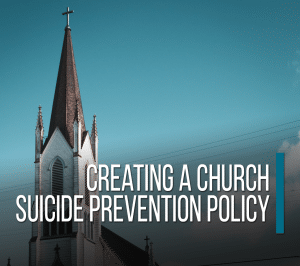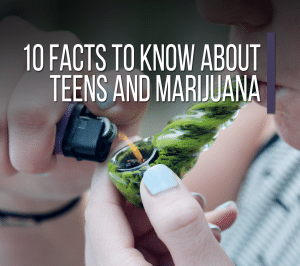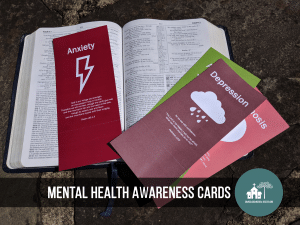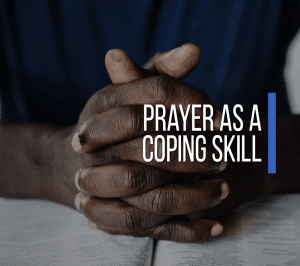As the year is wrapping up, we wanted to share some of our top posts of the year that pastors, counselors, and other Christians have been reading on the topics of Christianity and mental health. We are excited for what happened this year as we were able to reduce stigma about mental health, educate and train pastors, as well as find further direction in our mission. We look forward to what 2020 has to offer.
We’ve covered topics ranging from developmental disabilities, using faith practices as coping skills, educating counselors on mental health risks, addressing specific problems for youth ministry or marriages, as well as many resources and free videos for all Christians. For now, enjoy our top 10 posts of 2019.
1. Creating A Church Suicide Prevention Policy
I’m part of several church Facebook groups, constantly trying to keep in touch with what is happening in ministry. Many of these groups are open, honest, and raw, asking questions about mental health you may not actually ask in front of your senior pastor or elder board. One such question is what goes into creating a church suicide prevention policy.
I get excited by helping people bring mental health into the church, but I also want to encourage mental health professionals to listen up too. This is your opportunity to get your foot into a door of a church and help your community out.
2. My Church Breaking The Stigma
I don’t normally break the fourth wall and talk personally about experiences as I want this website to be a resource for mental health professions and churches to begin a dialogue on how we can unite together more. But this is one of those intersections where my personal experience can be an example, where my church is helping break the stigma of mental health.
3. A Christian Suicide Prevention Ministry: TWLOHA
We talk about the Church needing to step up with regards to mental health. No greater need from the Church is present than crisis services and suicide prevention and we’ve talked about how churches can help prevent this in their community now. And amazingly, there is a Christian suicide prevention ministry already there you can utilize, To Write Love On Her Arms (TWLOHA).
4. 10 Facts To Know About Teens And Vaping
Vaping is definitely the new fad for nicotine and with this new instrument, there are a lot of unknowns. This can be problematic for counselors and church leaders, especially for one of the most under reported populations, teenagers.
Yes, teenagers are using vaping and using it a lot.
5. 10 Facts To Know About Teens And Marijuana
Ever since I wrote the article 10 Facts To Know About Teens and Vaping, it has been at least the second most viewed article on our site. The article itself was actually written out of necessity because several youth pastors in a Facebook group were asking questions and not getting any answers.
This article is more out of having the content and helping the Church out in understanding the facts of the situation. The topic is very tricky because many times the experts on the topic are the people who use. So the fight is a bit of a disadvantage when discussing this, yet those from a Christian perspective tend to argue out of ignorance anyways and many times it’s one of fear.
6. Church Mental Health Awareness Cards
Mental health stigma is culturally a huge problem. Stigma is when someone views you in a negative way because you have a distinguishing characteristic or personal trait that’s thought to be, or actually is, a disadvantage.
It limits people’s motivation to engage in the treatment, getting the help they need, but also in the activities they are currently involved in, like church. Further, it can actually cause some mental health symptoms to create further harm and isolation.
7. Things Christians Say about Mental Health (vs What They Should Say)
Through personal experience and hearing shared experiences of other people, I have concluded that in most cases of any mental illness, people, and more specifically Christians, don’t know what to say. This comes down to a lot of stigma surrounding overall mental health, in the Church and out, but I’ll save that for another post. I’ll just say that what you do or don’t say to someone can really change their life; the Bible isn’t kidding when it says that the power of death and life are in the tongue.
This is one of those questions that as a youth pastor, I was faced with multiple times. Now as a clinical with a special focus on mental health and substance use co-occurring treatment, I address this from the standpoint of when it becomes a problem. The question is, is drinking alcohol a sin?
The interesting thing about doing this article is that I learned more in the process about Christianity than I did about the mental health side of things. What originally was going to be a thoughtful piece about the original article has become much more.
9. What To Look For In Christian Counseling
If you have not read our previous post on how a pastor can make a referral for someone to go to counseling and what pastors need to do to help, check out the article here. So you may know how to make a referral, but what should Christians and pastors look for when referring someone to counseling?
Below are the steps you need to know to ask for not only finding a good counselor but one that will also keep your spiritual needs at the forefront of the counseling. Further, we do not go into specifics of the difference between Biblical counseling and having a Christian counselor but will write about that in the future.
Prayer is one of the essential tools a Christian needs to learn in their journey with God. Throughout the last two thousand years, we have seen prayer take many forms, including praying in tongues, breath prayers, intercessory prayer, healing or thanksgiving, and prayers for salvation, to name a few. But for counseling, we see prayers used in a clinical environment as a coping skill.
We will explore a couple of ways that counselors can utilize prayer in their counseling session and how pastors can use it to promote better mental health.










